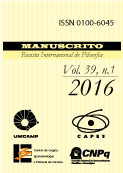Resumen
Scott Sehon (2011) argues that the conception of determinism employed in the Consequence Argument is implausible because it rules out the logical possibility of the laws of nature being violated. Sehon says, for instance, that determinism is incompatible with the logical possibility of an interventionist God (IG). His objection to the Consequence Argument boils down to a way of reading the box in what is implied by van Inwagen’s conception of determinism. Sehon reads the box as logical necessity, and this clearly precludes the logical possibility of the laws of nature being violated. However, I argue that determinism as employed in the argument is not implausible. First, I try to show that it is legitimate to read the box of □((P0 & L) P) as either metaphysical or logical necessity depending on the account of laws that one assumes. If one accepts a fully Humean account of laws, then the box should be read as logical necessity. Nevertheless, I argue that this is not a problem for the Humean. On the other hand, if one reads the box as metaphysical necessity, which is mainly motivated by the dispositional account of laws and might be motivated by Armstrong’s account, then determinism is compatible with the logical possibility of the laws being violated.Citas
ARMSTRONG, D. A World of States of Affairs. Cambridge: Cambridge University Press, 1997.
BEEBEE, H. The Nongoverning Conception of Laws of Nature, Philosophy and Phenomenological Research, 61: 571–594, 2000.
BIRD, A. Nature’s Metaphysics: Laws and Properties. Oxford: Oxford University Press, 2007.
CARROLL, J. Laws of Nature. Cambridge: Cambridge University Press, 1994
FINE, Kit. “Guide to Ground” in Correia, F. and B. Schnieder (eds.), Metaphysical Grounding: Understanding the Structure of Reality, Cambridge: Cambridge University Press, 2012.
LEWIS, D. Counterfactuals, Cambridge: Harvard University Press, 1973.
LEWIS, D. “Counterfactual Dependence and Time's Arrow”, Noûs, 13: 455–76, 1979.
LEWIS, D. “Are We Free to Break the Laws?”, Theoria, 47: 113–21, 1981.
LEWIS, D. New Work for a Theory of Universals, Australasian Journal of Philosophy, 61: 343–377, 1983.
LEWIS, D. “Finkish Dispositions”, Philosophical Quarterly, 47: 143–158, 1997.
RAMSEY, F. Foundations, London: Routledge and Kegan Paul, 1978.
SEHON, S. A flawed conception of determinism in the Consequence Argument. Analysis 71 (1): 30-38, 2011.
SHALKOWSKI, S. A. Logic and Absolute Necessity. Journal of Philosophy CI, 2: 55-82, 2004.
VAN INWAGEN, P. An Essay on Free Will. Oxford: Clarendon Press, 1983.

